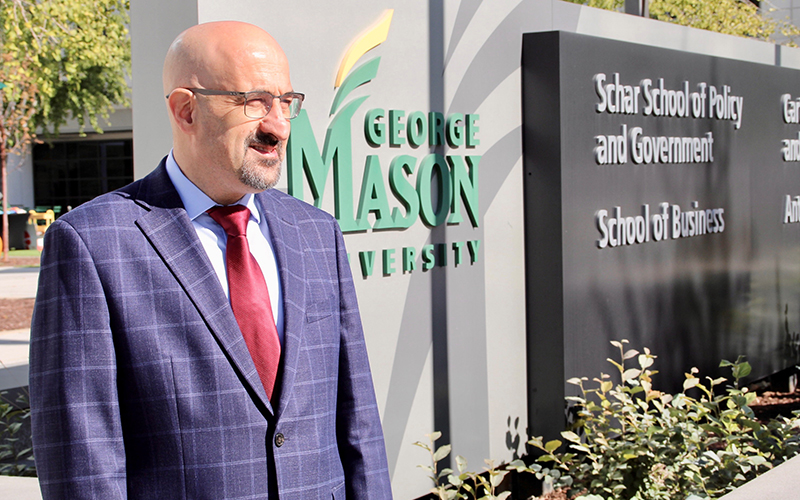
Mahmut Cengiz's first exposure to the brutal realities of transnational organized crime, terrorism, and illicit economies was in films he saw as a young man growing up in Türkiye. But these were not abstract horrors: They were living nightmares, unfolding in real time. The images of suffering and devastation seared themselves into his mind, igniting a fire in him to fight back.

Cengiz spent more than 15 years as a high-level official in law enforcement, focusing on counterterrorism and trafficking cases. During that time, he saved more than 300 victims of human trafficking. However, he had a larger goal in mind.
“I wanted to create a model to address human trafficking,” he said, reflecting on the lasting impact of his work. And to do that he needed to apply his passion to a different front—academia— where he could train the next generation of warriors to continue his battle.
Cengiz continues this work as an associate professor at the Schar School of Policy and Government at George Mason University, where he not only teaches students how to follow in his footsteps but also leads a number of initiatives devoted to dismantling the systems of evil that perpetuate human suffering.
For Cengiz, “it’s not a job; it’s a mission,” he said.
Cengiz is a graduate of George Mason, having completed his PhD in 2010 at the Schar School before joining the Terrorism, Transnational Crime, and Corruption Center (TraCCC) in 2015. His current research focuses on the convergence between organized crime and terrorist networks, a growing trend in the international underworld.
“Convergence equals collaboration,” he said, describing how terrorist groups learn from each other to strengthen their operations. For example, he examines how terrorist organizations have adopted money laundering and smuggling techniques from organized crime groups to fund their activities. For Cengiz, understanding this evolving dynamic is critical for developing effective policy solutions.
Cengiz is currently leading TraCCC’s Global Terrorism Trends and Analyses Center (GTTAC), which collects and processes data for the U.S. Department of State. In its seventh year at the Schar School, GTTAC has gathered over 55,000 terrorist incidents, including attacks by Al Qaeda, ISIS, Hamas, Hezbollah, lone wolves, and far-right extremist groups.
Cengiz invites and trains his students—there are 16 this semester—providing them one-of-a-kind, paid opportunities to work at GTTAC. Some 150 newly minted terrorism researchers have worked at GTTAC. That work often leads to publishing research and data-driven articles of opinion and to present their accomplishments at international conferences.
“They are exceptionally well-prepared to become young experts in analyzing terrorism and this critical security issue in the U.S.,” he said.
Cengiz appears frequently in international media outlets to share insights on transnational crime and terrorism. He regularly contributes to influential publications Small Wars Journal and Homeland Security Today, writing op-eds fueled by up-to-the-minute data collected at the GTTAC that raises awareness about the interconnectedness of terrorism, organized crime, and corruption.
He aims to make these complex issues more accessible to a broader audience, emphasizing the need for practicality and simplicity. His seventh book, Murder by Mail: The Global History of the Letter Bomb coauthored with Mitchel P. Roth, and other recent publications reflect his continued leadership and knowledge in the field.
Cengiz has a strong bond with his students and prioritizes enhancing their academic skills as they engage in analyses of global security issues.
In the classroom, Cengiz combines theory and practice, enabling students to gain from his real-world knowledge and transforming his expertise into impactful lessons. In fact, students have nominated him several times for George Mason’s Career Connection Faculty Award and the Teaching Excellence Award.
“My students appreciate the practical nature of my lectures and how I integrate field experience with theory,” he said.
Prospective students considering George Mason’s Schar School for their studies in international security will find an unmatched opportunity to learn from Cengiz and other top experts, including TraCCC’s founding director, University Professor Louise Shelley, as well as Master of International Security degree program director Ellen Laipson, Master of Biodefense and PhD in Biodefense director Gregory Koblentz, Distinguished Visiting Professor and former ambassador Richard Kauzlarich and others, including former directors of key agencies and current practitioners in important positions in Washington, D.C.
“We have great faculty with field experience and academic expertise,” Cengiz said, emphasizing the collaborative nature of the Schar School’s programs that often find diverse units combining expertise for research studies and panel discussions.
Cengiz’s work does more than analyze global security challenges—it actively seeks to combat them. His blend of field experience, academic expertise, and dedication to student success provides a pathway for those who want to make a tangible difference.
“You don’t just study these issues,” he said. “You gain the tools to confront and resolve them.”
In This Story
Related News
- February 12, 2026
- February 10, 2026
- February 2, 2026
- January 26, 2026
- January 23, 2026
